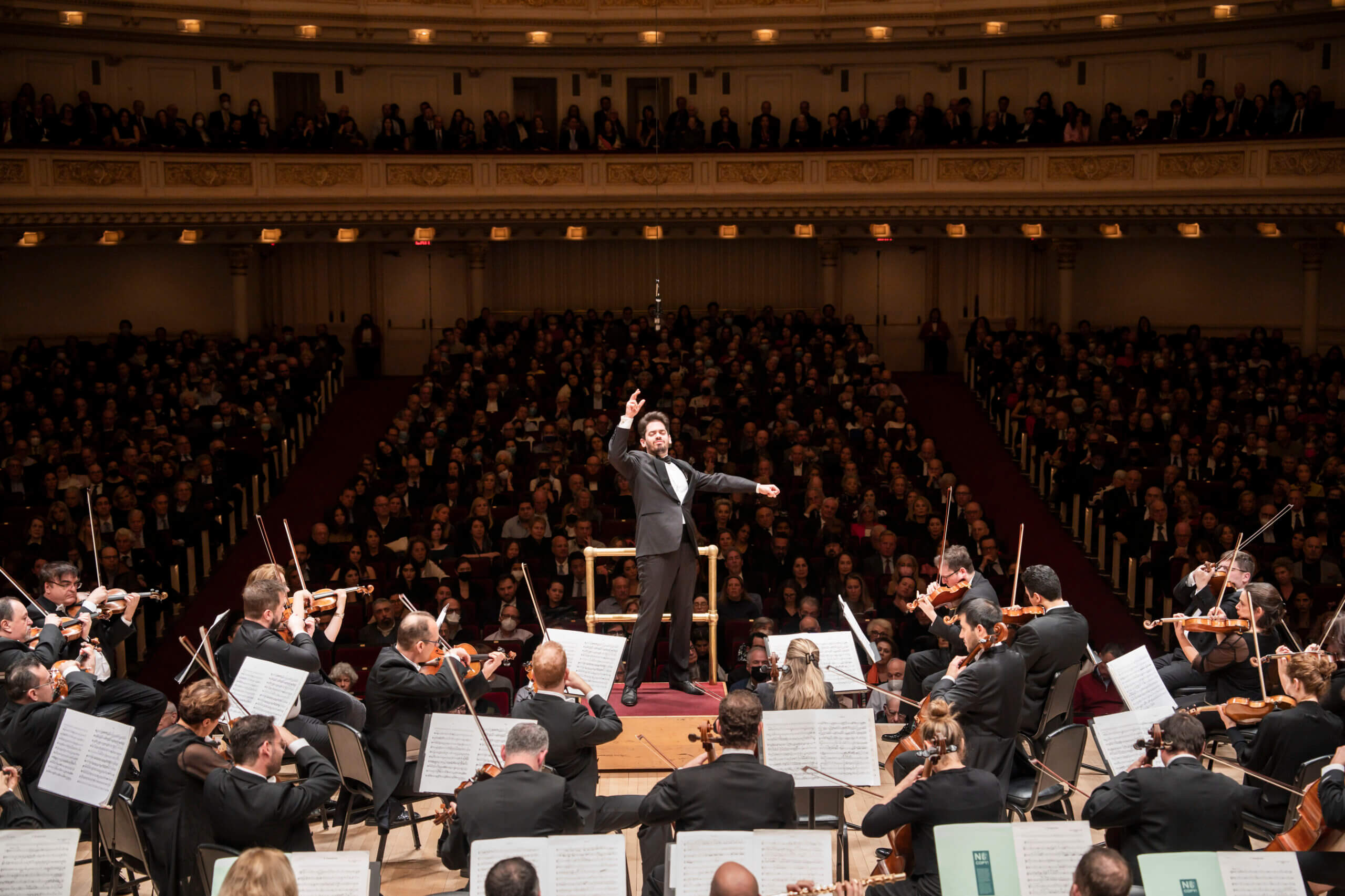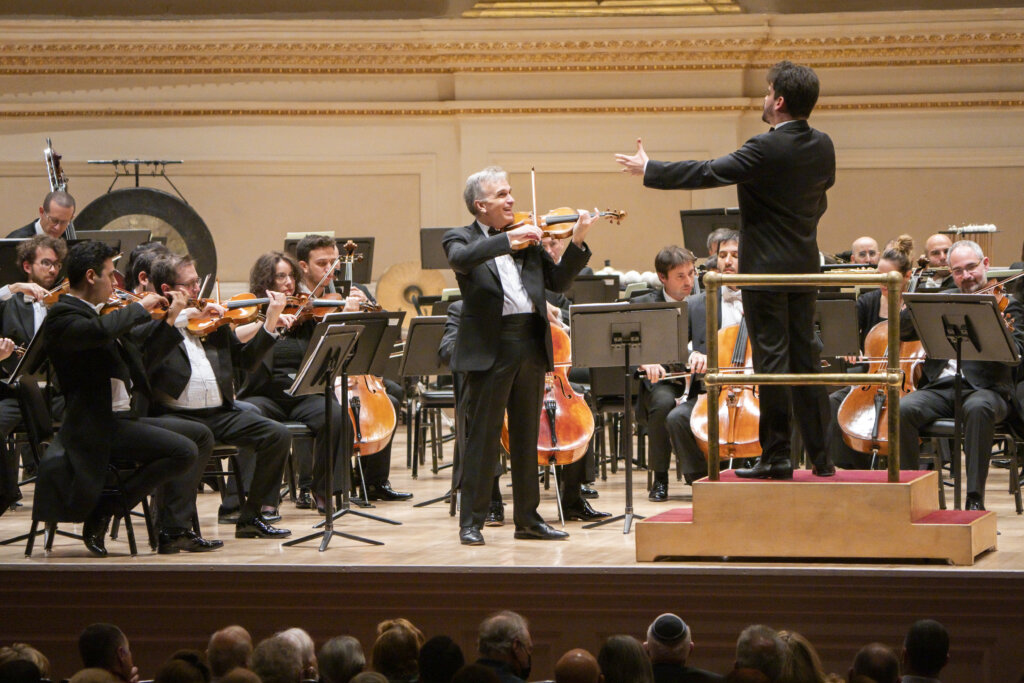Some orchestras banned Russian music — the Israeli Philharmonic embraced it
What does it mean for the Israel Philharmonic Orchestra to perform Tchaikovsky and Prokofiev while Russia wages war on Ukraine?

Graphic by Angelie Zaslavsky
What does it mean for the Israel Philharmonic Orchestra, itself forged of so much suffering, to be playing Russian music as Ukraine burns?
The Jewish state’s self-described “preeminent cultural ambassador” has just concluded their post-pandemic tour, performing a concert entirely of work by Russian composers. At every stop, they were met not with boycotts or protests, but with eager crowds and sold out venues.
Led by a 33-year-old conductor, Lahav Shani, who entered the role in 2020, the musicians delivered a forceful and engaging performance at Carnegie Hall last week. Star soloist Gil Shaham’s take on Tchaikovsky’s one and only violin concerto rivaled, if not surpassed, every recorded performance of the work I’ve heard. The gilded hall took on an electric charge as he pranced around the stage like a man half his age, the notes of his Stradivarius cutting through the auditorium, a look of unbridled joy beaming from his face.
It should certainly be a point of pride, for Jews around the world, that the Jewish orchestra is so good. And at a time when there are calls to boycott both Russian and Israeli artists, a Jewish orchestra composed of both, joyfully performing Tchaikovsky and Prokofiev for a packed house, felt like an act of defiance.
The IPO’s successful tour also demonstrates a fatal flaw in the logic of cultural boycotts: By attempting to silence a country’s past and present, you shut out the very people with the power to transform our shared future for the better.
A test of loyalties
In the nine months since Putin’s brutal invasion of Ukraine, the West has united around stopping him, sending vast amounts of weaponry support to allies in the region and attempting to cut Russia off from the global economy.
This fight has also fueled suspicion of, if not outright contempt toward, those who look or speak Russian. “When I am abroad, I can feel it now,” Kirill Mihanovsky, a cellist in the orchestra who was born in Leningrad, told me. “When people hear me speaking Russian, automatically, the red light is on.”
In the United States, some bars, liquor stores and restaurants announced that they would stop selling Stolichnaya vodka (made in Latvia) until the end of the war. In a Brooklyn bar, one Ukrainian man was so exercised by hearing another speak Russian that he broke two beer bottles and attacked the man, stabbing him in the neck and face.
Collectively, we’ve taken it upon ourselves to decide which Russian expats, many of whom still have family in the country and could face serious consequences for speaking out, are sufficiently disloyal to Putin’s regime.
Russian musicians and artists unwilling to denounce their brutal dictator have been punished. The Metropolitan Opera announced in February that it would no longer work with performers or institutions that had previously supported Putin, and fired one star Russian prima donna, Anna Netrebko, even after she issued public statements critical of the war.
In early 2022, some international orchestras, including the Cardiff and Chubu Philharmonic Orchestras, took it a step further. They scrapped even the performance of works by beloved Russian composers, declaring Tchaikovsky’s “military themed” 1812 overture “inappropriate at the present time.” It was a war not just on Russia, but on Russians — dead or alive.
Tchaikovsky is innocent
What should we make of these boycotts?
I asked that question of Mihanovsky, who has been a cellist with the orchestra for two decades. Mihanovsky moved to Jerusalem with his parents, both musicians, in 1990. A large wave of Russian Jews were trying to escape the collapsing Soviet Union, and “this wave took us,” as he put it.
“Tchaikovsky is not guilty in what is going on now,” he said. But at the same time, Mihanovsky can “perfectly understand” those who still don’t want to hear Russian music. “There is a horrible situation. You cannot blame them if they don’t want to hear Tchaikovsky anymore.”
I was surprised at his response, but perhaps I should not have been. The music of Richard Wagner, famously an antisemite and beloved by Hitler himself, is verboten in Israel. It’s worth remembering that Tchaikovsky, too, was probably antisemitic, as were many other beloved composers. Where should the line be drawn?
I understand those who want to ban the music of abusers, and who do not support artists or regimes that they believe are actively harming others. But Tchaikovsky’s music, to me, is not a symbol of Russian dominance, but of transcendence. Music has never been apolitical, but it certainly is one of the few things with which we can build the connections between people necessary to transform society for the better.

In their attempts to close off a country’s inhabitants from the rest of the world, cultural boycotts undermine rather than fuel such positive change. Such tactics have also long been used by anti-Israel activists to sanction artists, academics, and musicians, like Mihanovsky himself.
Before modern Israel even came to fruition, there were boycotts of it. Those who build the country today — Jews expelled from the Middle East and North Africa, Europe and the Soviet Union alike — are at once accused of “cultural appropriation” for consuming the foods of their childhood and told to go back to the lands from which they’ve been expelled.
Proponents of cultural boycotts, such as the international Boycott, Divestment and Sanctions movement, accuse Israel of “overtly” using “culture as a form of propaganda.” This sounds to me like a call for the erasure of Israeli identity entirely — similar to the line used by Putin to justify his invasion.
Putin has repeatedly claimed that Ukraine “never had a tradition of genuine statehood,” and that it should rightly be a part of Russia. Under siege is not just a country of 43 million, but Ukrainian identity itself.
This threat of cultural erasure has forced many Ukrainian expats, particularly many Ukrainian Jews, to think about their identities in a new way.
“I do not condone Putin’s actions at all, and I believe in Ukraine’s sovereignty and right to democracy,” Alex Stern, who emigrated from the USSR in 1987, wrote in the Forward’s opinion pages in January. Growing up, “I was made painfully aware in Ukraine that I was not Ukrainian,” he added. “In Ukraine, we Jews were shown over and over that we were not wanted.”
This is a perennial problem. No matter how American, or Ukrainian, or Russian, or European we may become, antisemitism always returns, forcing us to choose between the country that we love and the people that we are.
“It’s not that I suffered — I felt ok,” Mihanovsky says of his childhood in Russia. “But at the same time, in the background, there was always this little feeling, like you are different.”
“I’ve been always asking myself, actually, who am I? A Russian Jew, a Jewish Russian, an Israeli?” says Mihanovsky. “And at some point I just stopped. I said, I won’t ask myself anymore.”
A place of refuge
It was in Israel, a country created so that Jews could “be masters of their own fate, like all other nations, in their own sovereign State,” that Mihanovsky reached this place of acceptance. In a Jewish state, a Jew can simply be.
The Israel Philharmonic Orchestra was likewise founded chiefly as a means of survival. In 1936, as Hitler unleashed a genocide on the Jews of Europe, a Polish violinist brought hundreds of musical Jewish families to Israel, creating the orchestra and saving their lives.
The members of the orchestra today are inheritors of this legacy — and of so much additional baggage. They represent not just a people, but a national project, and the power of music itself.
Their success provides an example of what happens when we attempt not to cut off a place, but to fuel the better impulses of its people. The Israeli symphony will not cure all that ails modern Israel, nor the Jews. But the orchestra has, for nearly a century, provided an example of Jewish identity based not on politics or religion, but on music, a cultural ambassador of the better angels of our nature.
Perhaps it is through music that we become a light unto the nations. To even have a Jewish orchestra this good, composed of so many survivors and creating truly beautiful music, would be enough.
“I just looked around, and I saw that everyone was crying, not just me,” says Mihanovsky of a recent performance. “I said to myself, wow, it’s good I’m here.”
Correction: The original version of this article misstated the nature of Richard Wagner’s antisemitism. He died in 1883, before the advent of the Nazi party.





















